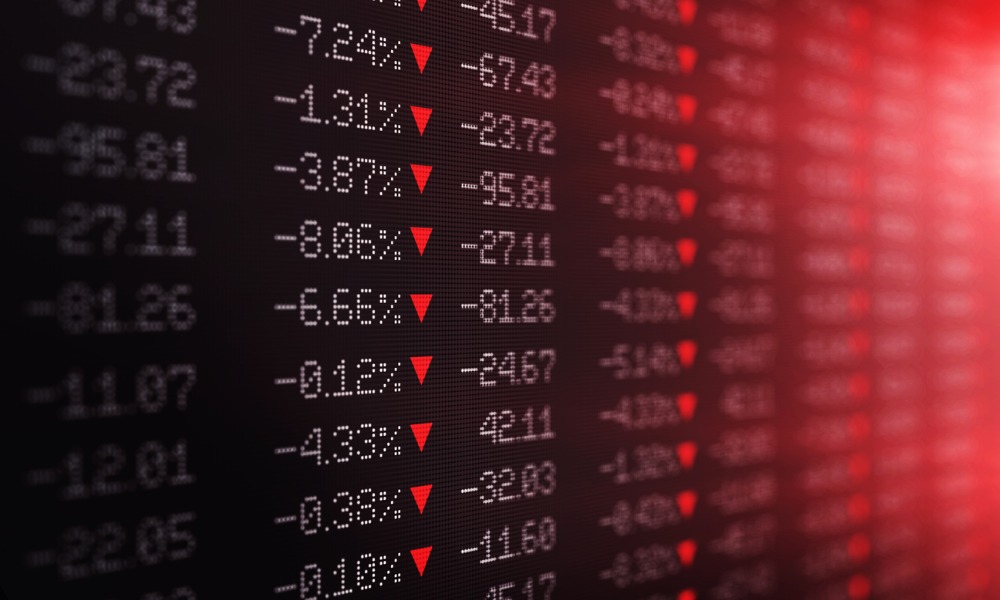A growing number of analysts are calling for a slump but others are less concerned

With the coronavirus outbreak worsening money market analysts are becoming more negative on the potential impact.
The bonds market has slowed this week with Bloomberg reporting that Wall Street banks have seen three straight days without any high-grade bond offerings, European bankers saw their first ‘no-deal’ day Wednesday, and Asian bond issuance is down to a trickle.
Some are focusing on the buying opportunity they see from the slump in Chinese shares.
“We think investors should be buying the dip in emerging-market stocks and specifically Chinese stocks,” Maximilian Kunkel, chief investment officer for Germany at UBS told Bloomberg. “You have a more attractive valuation and growth mix here and also China seems to be containing the virus and getting back to business.”
In a client note, CIBC Economics’ Avery Shenfeld wrote that there are a large number of possible outcomes in terms of the economic impact of the virus spread. With still so little known about its trajectory, even modeling the likelihood based on previous pandemics (Covid-19 has not been officially declared a pandemic by the World Health Organization) is challenging.
Shenfeld and CIBC team are expecting a single interest rate cut this year from both the BoC and the Fed; and will hold that view unless there is evidence of transmission within the United States.
“If that indeed happens, the macro analyses reviewed herein suggests that the economic consequences of a pandemic would justify a monetary policy response, perhaps coordinated globally, to shore up confidence,” he wrote.
This week, the CEO of global insurer Allianz said the panic over coronavirus is an overreaction. But whether or not that is the case, the market will continue to adjust.
“Our best guess is that the drawdown in risky assets has further to go, although after a sizable pullback the short-term risks appear less asymmetric to the downside,” said Goldman Sachs Group Inc. strategists Zach Pandl and Kamakshya Trivedi, in a client note Wednesday. “U.S. markets in particular will need to price not only a possible drag on activity from the virus, but election-related risks as well.”
Real estate investors
The Vancouver-based Real Estate Investment Network says that the impact on real estate investors should be short-lived.
They include:
- Temporary, small decrease in GDP growth
- Increased immigration
- Increased foreign capital
- Increased demand
- Leading to increased property values
And REIN says that these represent a buying opportunity now.
“It’s still premature to predict how the coronavirus outbreak will be resolved, but data suggests that panic will only worsen the country’s economic situation. There is reason to be alert, but there’s absolutely no reason to further raise alarm and cause more public fear. In fact, as a Canadian real estate investor, this may represent a buying opportunity for investors with a likely future positive lift in rental and housing markets,” says Jennifer Hunt, Vice President Research for REIN.
She added that once the outbreak recedes, there is likely to be a return of Asian investors to the Canadian real estate market.
“When the situation normalizes, one can expect an influx of Chinese immigrants and capital to Canada resulting in increased demand for real estate. For a myriad of reasons, including continued Canadian GDP growth, the coronavirus represents a buying opportunity for Canadian real estate. In times like these, rely on trusted sources, like REIN, to unpack these confusing and evolving situations,” she said.
Recession?
While coronavirus is dominating the headlines, there are other ongoing headwinds threatening the global economy including the US-China trade dispute, tension between the US and Iran, and the US presidential election.
“The combination of these headwinds is likely to dampen business confidence and investment, profits, and consumer demand throughout the rest of this year, said Nigel Green, CEO of financial advisory firm deVere Group. “Together they could push the world to the brink of a global recession this year. This would be severe because central banks are running out of weapons to see off the threats.”
To the brink, but not actually into recession?
“Whilst I am confident that we’ll narrowly avoid a global recession in 2020, no-one can accurately predict the future – as we have seen with coronavirus, which markets wrongly assumed would be limited to mainly China.”



